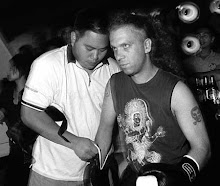Not to harp overmuch on the whole
absence making the heart grow fonder thing, but another thing about Hong Kong I appreciate is just how easy it is to get out of the place. With a good tailwind, a hawk might make it from the Lan Kwai Fong to the Lo Wu shopping center in Shenzhen in half an hour, though what it would be doing in either place is beyond me. It took me and the Lamingtons twice as long yesterday, but Emma Lamington insisted on stopping at one of the malls in the KCR station to look at some shoes. I explained to her that she’d be better off waiting until we crossed the border – “Shenzhen is, among other things, a colossal shoe store,” I told her – but she seemed enthralled by some hideous pair of black boots, expressing doubt that she’d be able to find her size someplace where big noses are so much less prevalent than they are in Hong Kong.
Being Australian, the Lamingtons were able to get themselves a “visa on demand” for 150 HKD. This five day visa entitled them to visit Shenzhen, but only the three districts directly across from Hong Kong proper. I had initially planned to take them over to Longgang to check out the old Hakka enclosures, an excellent example of Ming dynasty paranoid architecture. The massive stone structure in which the local Hakka tribe once lived before migrating to Taiwan has vertical arrow slits, allowing for quick dispatch of unwelcome guests. Once upon a time, there’d been internal border controls inside Shenzhen; these have been mostly done away with, but there are still occasional spot checks at highway toll booths. We decided not to risk it, and instead spent the rest of the day shopping at the massive Dongmen pedestrian mall, where Emma bought a pair of Converse from a quick-talking elf of a boy who’s English sales pitch was peppered with phrases like “whatever you want in shoes I got it, man” and “Hey man, no pressure.” Matt and I split a ten pack of boxer shorts.
Hong Kongers tend to view Shenzhen with dread, a lawless no-man’s land rife with pickpockets, kidnappers, hookers and men with bad fashion sense. The attitude is understandable on one level: Though appearing chaotic to the outsider, Hong Kong is a well ordered city with all the legal channels and trappings that you’d expect in a society boasting rule of law. If a merchant in Causeway Bay does dirty by you, finding an authority to address your complaints to is simply a matter of knowing where to look. The situation might not get rectified, but the hope that it might is always there. Shenzhen is, by comparison, a frontier town, where
Caveat Emptor is the only relevant law of consumer protection. That and the uncomfortable knack that the local criminal class has for spotting (and fleecing) their wealthy their slumming neighbors to the south makes Hong Kongers somewhat uncomfortable about walking the streets of Shenzhen for extended periods.
As a New York City boy, I get off on Shenzhen’s air of implied threat. In years of exploring the streets and markets of the city, the most uncomfortable occurrence I’ve ever been through has been a series of gang-beggings in which I was surrounded on all sides by hideously cherubic child beggars, elderly cripples, and people with various deformities all looking for spare change from the visiting round-eye. The Lamingtons had never seen this kind of thing, and seemed taken aback when we were attacked on mass just outside of the Shekou pedestrian mall by a small gang of kindergarten age children asking us to give them all a dollar. Stupidly I made the mistake of doing this (because I am, at heart, a sucker), and wound up having three or four of the runty swindlers hanging off of my arms and trying to relieve me of my wallet. These things do not happen in Wanchai.
We shook off the urchins and in a true show of bourgeois extravagance hopped a taxi to Brown’s Wine and Cigar bar in the OCT (Overseas Chinese Town), perhaps the swankest neighborhood in Shenzhen. At Browns Matt and I smoked a couple of Cuban cigars while Emma had a glass of red wine that cost almost as much as our dinner had. The bar was filled with Nuevo rich Shenzhen businessmen blowing the equivalent of a month’s wages for average Chinese urbanites on cognac and prosciutto ham. We spent the night at a Korean Sauna in Futian, where we all got massages and a place to stay for about 170 Yuan per person. In Shenzhen this kind of extravagance is pretty much
de rigueur.

